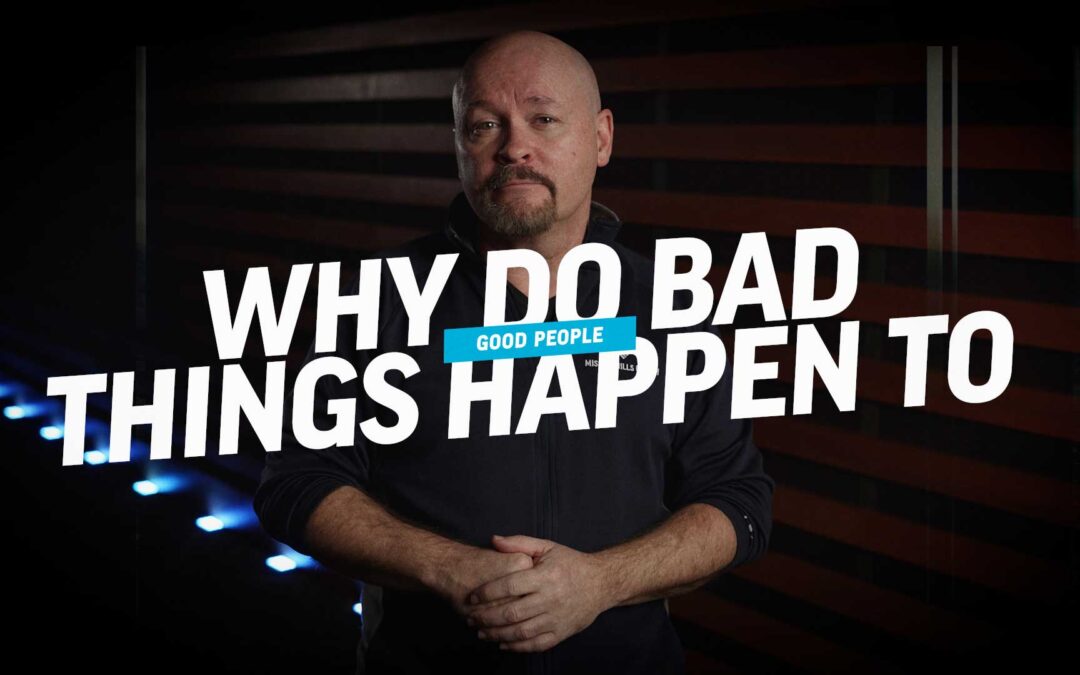Our culture enthusiastically embraces the saying, “No pain, no gain,” a concept we appreciate until we find ourselves in pain, desperately seeking relief. However, not all pain is inherently bad; it hinges on one’s perspective.
When we are working out, we willingly accept pain as part of the price we pay to get in better physical shape.
Today I want to focus on that kind of understanding to think about a big question:
Why do bad or painful things happen to good people?
This is one of the deepest, most difficult questions that Christians have ever asked, and we’ve been asking it for thousands of years. Unfortunately, the subject is too big to be thoroughly addressed in a blog post.
There have been countless books written and messages preached on this subject and yet, here we are, still grappling with that same question.
The problem we keep coming back to is the fact that, if God is all good and all powerful, then why do bad things happen?
If he is all good, he wouldn’t want bad things to happen. And if he’s all powerful, he could keep the bad things from happening.
Yet, we witness bad things happening, even to seemingly the best people.
A Matter of Perspective
I want to begin framing this discussion with a caution to be careful about not using absolute terms to describe relative things.
When we say a thing is good or bad, we force ourselves to view it as black or white. But the reality is most circumstances that we face in life, especially in a world that has fallen and has been impacted by our sin, are relative.
It becomes very difficult to label things as purely good or purely bad.
Consider a scenario: a newborn with a significant spinal malformation. The child may not perceive the issue, but their parents and doctors do. If uncorrected, it could limit their future potential significantly. Surgery is an option, but it’s painful, with a demanding recovery. From the child’s viewpoint, this might seem like a terrible experience, but it is considered good because it leads to positive outcomes.
Sometimes, we label things as “bad” when they are merely painful or diverge from our preferences.
Free Will is Part of God’s Plan
We should be cautious when making judgments, especially regarding why God allows seemingly bad things to happen to good people. There might be valuable lessons and growth hidden within unpleasant experiences.
Consider the example of Adam and Eve’s sin, which initiated humanity’s fall. God, who knows all things, could have created them without the capacity to sin, effectively making them robots. However, this would negate the possibility of genuine relationships based on free will. To have authentic relationships, individuals must have the choice to accept or reject them. Therefore, God allowed the potential for sin, despite the pain it might cause Him and His creation.
Through these experiences, God ultimately seeks a group of people who willingly choose a relationship with Him, even when they have the capacity to say no.
Painful events may serve a greater purpose in God’s plan, leading to long-term good.
Touching the Hot Stove
When my kids were little, we had an induction stove that did not have regular burners; the surface of the stove would heat up and glow red. My kids really wanted to touch those red glowing things! And of course, I did not allow that to happen, but what if I had?
If my children had touched the red parts of the stove, they would be in massive amounts of pain, which would also hurt me. Do you think, however, that they would ever touch the stove again? Probably not.
They would still be in possession of their free will and have the ability to touch it, but they just wouldn’t want to. Which begs the question, why did God allow Adam and Eve to sin? It grieved God, because He experiences the pain of His children and ultimately took that on His own son Jesus, on the cross.
But by allowing us to touch the stove, so to speak, He winds up with a group of people who say yes to relationship with Him forever, never to dwell in sin again.
Recap
The positive outcome of free will, for the believer, is to never say no to God again. Instead, we say yes to God and no to sin for all of eternity, while still retaining the capacity to sin.
That is the essence of real relationship. So perhaps that is why, even in a life full of pain for us and our Creator, the reason we’ve been allowed to touch the stove is because God is focused on the result; people being transformed into overcomers who reject sin and radically love our God.
And that, my friends, is not an easy truth to grasp, especially when in the midst of pain or when something bad has happened to us or someone that we care deeply about.
It also doesn’t soften the pain to God. God is always moving towards his long-term game plan; the greatest possible good. And He is scrupulous in His intent to also allow authentic relationships to bloom and grow, but to do that He allows some unfortunate things to happen. That long-term gain softens the pain that He feels along the way as His children suffer.
Have a question you’d like to ask Craig? Click the button below!
Related Video

AUTHOR CREDITS

Lead Pastor

GRAPHIC CREDITS
🎨 Credit | Zac Anderson
Video Production Specialist


